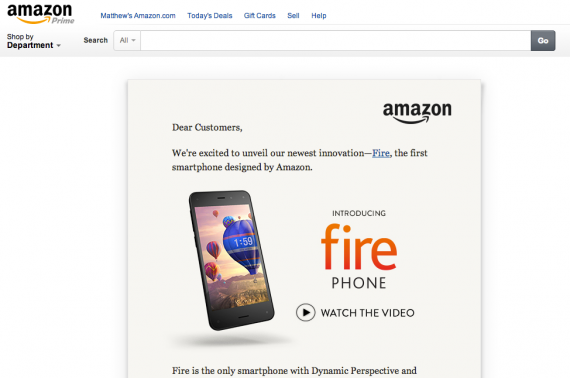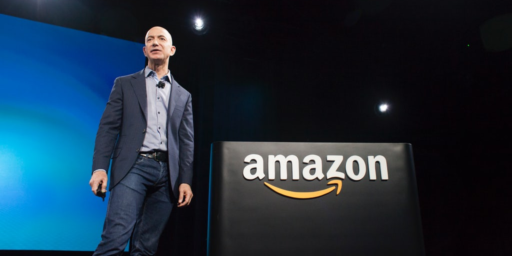Amazon’s next step towards total retail (and search) domination
Some thoughts on Amazon's new smartphone: Fire
In case you missed it, yesterday Amazon announce that its building its own smartphone, the Fire. In fact, for the moment, Amazon’s homepage is dedicated to the Fire — or rather a letter about it from Amazon CEO Jeff Bezos.
What’s particularly interesting about the Fire is one of it’s exclusive applications: Firefly. Firefly is media recognition software that is so important to Amazon that they literally gave it a dedicated button on the Fire. In addition to scanning business cards and other printed material to extract information like phone numbers and email addresses, Firefly is geared for retail.
Writing at the LA Times, Carolyn Kellogg fills in the details:
[Users] point their Amazon phone at any consumer object in the real world and then shop for it on Amazon.
Demonstrating the tool on stage, Amazon CEO Jeff Bezos used an Amazon Fire to photograph a DVD and a book, then showed how they were for sale on Amazon.
Firefly stores the photos. When a user taps on them, it takes them to the Amazon sales page. Reporting from Seattle, Gigaom explains what happened next. “tap on the book: You can buy the Kindle edition, the paperback or the audiobook right there.”
As Kellogg notes, this has some implications for traditional brick-and-mortar retailers:
Amazon has built it into its new smartphone, insitutionalizing and encouraging customers to use brick-and-mortar retailers as Amazon showrooms.
This was controversial back in 2011, when during the holiday shopping season Amazon offered customers a discount if they used an Amazon app to photograph items for sale in bookstores and instead bought them online.
There was an outcry, in print and, well, online. Pulitzer Prize-winning novelist Richard Russo wrote an op-ed criticizing the practice that included the thoughts of many fellow writers, like Dennis Lahane, who called it “scorched-earth capitalism.”
Critics contend that Amazon is taking advantage of brick-and-mortar retailers, who have many real-world expenses the online retailer does not: rent, utilities, and salaries of local residents. Shoppers at local retailers pay sales tax, which goes into city coffers to pay for things like road maintenance, police, and schools. After successfully fighting off many attempts to get it to collect sales taxes, Amazon has begun to in a few states (16, as of December).
What’s interesting about Firefly is that it does a number of things strategically for Amazon. First, and most obviously, it’s a way to generate sales (arguably at the expense of existing retailers, hence the accusation of “scorched earth capitalism”). It’s also generating critical user information for Amazon. Even if a user decides *not* to buy an item via Amazon, Amazon knows that said user was interested in purchasing this item. That data will, in turn, change their recommendations. This get’s to the final interesting point — Firefly cuts Google out of the loop.
A critical part of the reason Google developed the Android platform was to gather additional user information (as Google has always been in the Information Business). And while Amazon benefits from people searching for products on Google, Google gets to retain that information as well. Firefly, even though it runs on a Google OS, leaves Google out of the search loop. This is not the only place where Google is cut out of the loop. The Fire is shipped *without* a number of standard Google Apps. In particular, Yelp Maps comes installed instead of Google Maps.
Given how much smartphones are used for media consumption, one has to suspect that much of Amazon’s desire to offer a smartphone is tied to getting more *exclusive* data on their customer’s buying and media consumption patterns.
[Update 4:45 EST, 6.19] As commenter Stormy Dragon points out there are some other noteworthy data implications:
As well as (thanks to GPS), the specific store that they lost the sale to.
Not only does GPS/Location Services provide Amazon with this sorts of data, it allows them to map potential price variations and interest in product by region as well. Again, this is data that they already had some access to (via IP address and shipping data), but it’s a new level of refinement.







As well as (thanks to GPS), the specific store that they lost the sale to.
We’re an Amazon Prime family. I have 4 Kindle Fires (from the original to the HDX). I purchase stuff regularly on Amazon. All that being said, I wouldn’t even consider buying this new phone. I have a Nexus 5 precisely because I want to be able to easily integrate all the of the Google services that I use everyday. Any phone that purposely makes that harder is not a phone I want to own.
@Stormy Dragon:
Great point. I have updated the original post to reflect it.
@Todd:
What’s interesting to me is that Amazon isn’t engaging in a higher level of discounting on the device itself. One of their strategies with the Kindle was to elect to lose on the hardware costs to make it up on the backend. This phone, however, costs more (off plan) than my existing Samsung Note 3 and doesn’t offer a significantly more advanced set of functionality.
As a longtime and rather heavy Amazon Prime consumer, I love the idea. But I’m befuddled that they’re bothering to make their own phone. Why not just make this an app for existing phones? The idea, presumably, is to get people to buy merchandise from Amazon, not sell phones.
@James Joyner:
I suspect that some version of Firefly will make it to some Android phones in the near future.
My be is that, as with Kindles, Amazon sees controlling the media ecosystem as the best way to ensure people buy from them (at some stage). They are giving everyone who buys the phone free Prime for a year (which include’s Video). And, as I wrote about, I think they are betting on harvesting a LOT of useful data.
All that said, I’m still surprised that they phones cost so much. If their goal is to use the phones as another gateway into the wallet, it seems to me that it would make more sense to treat them as a loss leader.
@James Joyner:
Amazon probably doesn’t want to share the data collected with either Apple or Google.
And I doubt that the app would be allowed in Apple’s app store, and if it was, wouldn’t Amazon have to fork over 30% of every sale through it to Apple?
How useful is Firefly? It’s not like it’s really that hard to check with Amazon while you are in store with a smartphone now. What does it shave away, for a consumer? Two minutes? It would have made more sense to suck it up and release the app for Android and iPhone use.
It’s way too late to get into smartphones. This is something that should have happened two to three years ago.
Also, according to the article it works for books, but how many book buyers are there who buy books at bookstores because of the price? Unless it’s a used bookstore, most people by now will have figured out that Amazon is cheaper, so they’re buying for convenience.
The real question would be whether it works for other items–like clothing.
Although nearly everything I buy these days is through Amazon Prime and since most of my reading is done on my Kindle FireHDX so I really don’t have a choice but to buy my books from them their increasing monopoly on retail sales does frighten me. I am a retired baby boomer who lives in the burbs but no longer drives which leaves me little choice but to shop online. I usually buy my clothes from Landsend or the Vermont Country Store but everything else is from Amazon.
@James Joyner: I have given up on trying to figure out Bezo’s business model. He sells lots of stuff but makes very little money.
I find myself on the skeptical side here. I thought that they did have a market, but they went for a different market instead. I was thinking they would do something bigger, like work something out with AT&T so that people like my father could get a smartphone but with very limited data capability instead of the black-and-white in-or-out that kind of dominates now. Tough sell on AT&T, though, so probably an unrealistic thought on my part.
I’m an Android user who is pretty furious with Google right now, but I am not seeing anything here that would make me interested in switching if I were an AT&T customer. Like @Todd I am pretty ensconced in Googleland and as angry as I am, this doesn’t make me question that.
Walled gardens are still walled. Like Matt and trumwill (I think it’s actually unanimous so far), I don’t see the point of a device locked into a single vendor. If the thing was like one tenth the cost and susceptible to having its guts overwritten with an open environment it’d be a lot more interesting.
As a tentative example, my brother in law went to a grand opening of an electronics store in NYC and picked up a coupe of Azpen 727 tablets for $20 and sent one to me.
This thing runs Android, doesn’t have a phone, but it has wifi and a 7″ screen. Initial impressions were the thing is very cool. But it’s proving awfully resistant to installing things like Ad Block Plus and No script, without which the web is just not usable. Hopefully this will prove rootable for usabiity as time passes. $20!